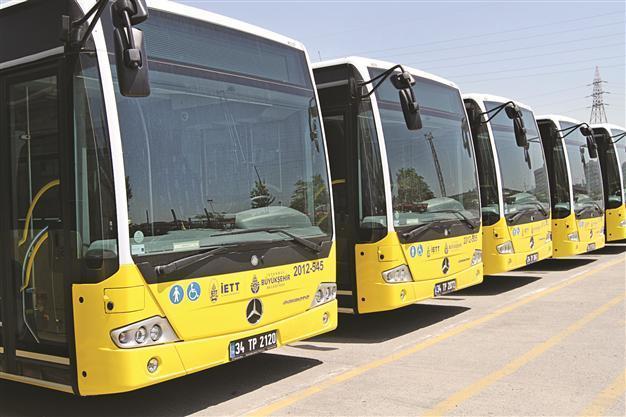Data recorders to increase quality of bus rides in Istanbul
ISTANBUL

DHA photo
Istanbul’s public transportation company has said it will start using data recorders, which are common in airplanes, in their buses to collect more than 80 different data sets to improve driving quality, hopefully avoid accidents and determine the cause of accidents.
The Istanbul Electric Tram and Tunnel Company (İETT), which regulates and controls public transportation in the city, announced they will use the data recorder system in buses to prevent problems faced both from the passengers’ and from the company’s side.
The data recorders, which are commonly found in airplanes and have recently started to be used in other sectors, will track and record the conditions of the vehicles and the drivers, which will function as a source of data.
The system will not only record more than 80 different data sets, it will also analyze them. While the system will collect data on topics such as fuel efficiency, braking frequency, engine temperature and idle waiting time, which will be collected to enhance the efficiency of the way the buses are driven, data such as the ambient temperature inside the bus are aimed at improving the quality of the ride for passengers.
At a time when commuting can take up to four hours a day and can be very painful for an Istanbul resident, knowing the density of a bus that one is waiting to take can help somewhat ease that daily pain.
The new data recorder system will be able to weigh the bus and define the passenger occupancy rate, which will also be made public via the İETT’s mobile application, MOBİETT. Thus, the aim is to improve the quality of the transportation served to the residents of Istanbul.
Mümin Kahveci, the general manager of İETT, which controls the city’s bus lines, metrobus lines, the Tunnel in Istanbul’s Beyoğlu district and the nostalgic tramway running on central Istiklal Avenue, said the data recorders will allow for all data regarding buses to be collected on an instantaneous basis and thus the reasons for breakdowns and accidents could be determined immediately.
Stating they aimed to prevent possible accidents by collecting data from the buses’ communications network, Kahveci added they also aimed to conduct deeper research on how and why an accident happened.
“We will also instantly see the drivers’ driving performances by making use of the electronic communications network topology that are found in the buses’ systems,” said Kahveci. “Thus, we will evaluate our drivers on the basis of their performances.”
Kahveci said with the data recorder project, they would be able to define an efficient way of driving and using the bus, which they would also use to train their drivers.
This new application comes as a move to minimize accidents caused by drivers’ and also technical faults.
Recently, a public bus in Istanbul crashed into a railway overpass which started a fire that caused the bus to explode.
On June 21, the compressed natural gas-operated bus crashed into the 2.8-meter-high suburban railway overpass in the Fatih district of Istanbul, eventually causing the bus to explode.
Just a day after this explosion, a passenger was injured when a metrobus crashed into a construction container on Istanbul’s Bosphorus Bridge.
The metrobus driver reportedly lost control of the vehicle, which could only be stopped when it crashed into a container on the road.
